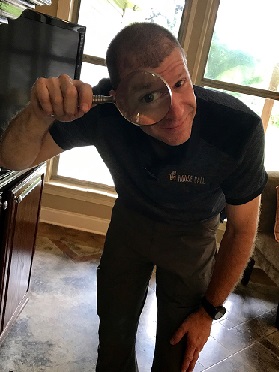Every entrepreneur knows that the startup phase of a new business can be the most difficult one to survive. A lot of different things must come together simultaneously for your business to prosper. Often, this proves to be too much for the burgeoning new business, and it ends up going under. One of the more difficult things to deal with are all the different, ancillary tasks that must be done to keep the business running. When I started my own business, I wanted to be a home inspector. I wasn’t planning on being a part-time accountant, bookkeeper, marketer, CPA, secretary, computer tech, janitor, benefits manager or psychologist. But here I am, wearing so many different hats it would make Pharrell Williams jealous.

This unavoidable reality can serve as a significant source of stress for business owners, as these various and different tasks are (typically) not something that the average person does well. I know how to inspect a house; QuickBooks, not so much. So, I had to do whatever it took to be able to perform these other “non-inspection” duties in a reasonable manner.
My approach to this problem has morphed and changed over the years and will continue to evolve as new ideas and techniques are learned. Currently, the system that works best for me is a combination of just-in-time learning and guide building. I learn what I need to know, right before I need to know it; taking advantage of the wealth of information available on the Internet. Now, this advice does seem to fly in the face of the approach that I normally advocate, which is to always spend time learning new things.
While the importance of continuous learning cannot be overstated, the fact remains that we all have a finite amount of time available to work each day and must utilize that time wisely if we are to be successful. It makes much more sense for me to invest my most important limited resource (time) learning as much as I can about my primary job (home inspecting). The fact that I must figure out how to run a “Monthly Detail Register Report” in QuickBooks can be dealt with right before I have to run that particular report.
The other part of my system involves building guides to help get me through the difficult tasks that I perform on an intermittent basis, such as rectifying my books at the end of each banking cycle. For tasks like these, where I am not entirely familiar with the process and perform it too infrequently to develop any type of routine, I find that it helps tremendously to document what I am doing while I am doing it. For example, if there are 6 different things that I must do to close out the books at the end of the month, then the next time I am going through that process I will take a little extra time and write down some instructions based on my actions. Then, at the end of the next month, I will have a “cheat sheet” to help guide me through the process, making upgrades to the process along the way.
These “cheat sheets” accomplish two important tasks for my business. Obviously, there is the immediate benefit of helping to make those intermittent tasks a little less stressful. In the long-term, they will prove useful when my business starts to grow. Why perform a certain task, like bookkeeping for example, at a 40% efficiency (as that’s about the most proficient I will ever be at bookkeeping) when I can afford to pay someone else who is better at it than I am? If I can afford to pay a bookkeeper (who probably works at a 90-100% bookkeeping efficiency), who will do a better job than I would in a shorter amount of time, it would be stupid for me to not hire that bookkeeper.
As a result of developing my “cheat sheet”, when I do finally hire a bookkeeper, I will already have guidelines written out, detailing exactly what I am looking for from my bookkeeper. My new bookkeeper will now have a clear idea of what I am trying to accomplish and will (more than likely) develop a better process to achieve the desired result. The subsequent level of understanding between my bookkeeper and me will certainly reduce my level of stress, making the task of delegating responsibility an easier process.

Every person has something that they excel at, personally and professionally. Unfortunately, we are often tied down by the minutia of our everyday tasks, and never really get to focus on what we do best. If we can figure out how to remove all of the ancillary tasks from our day, and focus on the one thing that is “in our wheelhouse,” the one thing that we can do better than anyone else, the sooner we will become a success. The sooner that you reach the point where you can start delegating the tasks that you are not that good at, the sooner you can begin focusing on what you are good at, and grow your business.
I welcome all feedback (positive and negative) about my take on this subject. Please leave your comments below. Thank you!
Please Share with Friends!
I thoroughly enjoy creating these posts for you, the reader. Please take a moment to comment, letting me know what you think about the topic, and passing along any of your knowledge to our community. Please feel free to get in touch with me, letting me know if you have any specific topics that you would like to see covered on the site. And please feel free to share this content with your friends. The more people that we can help in their careers, the better!
 Thanks, Joe
Thanks, Joe
